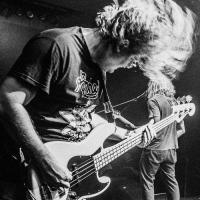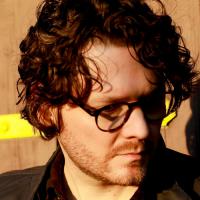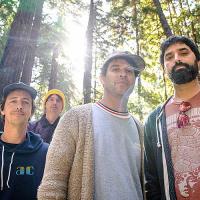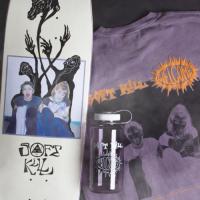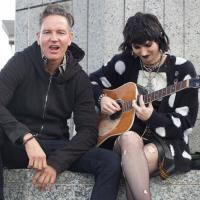Slightly Stoopid Interview
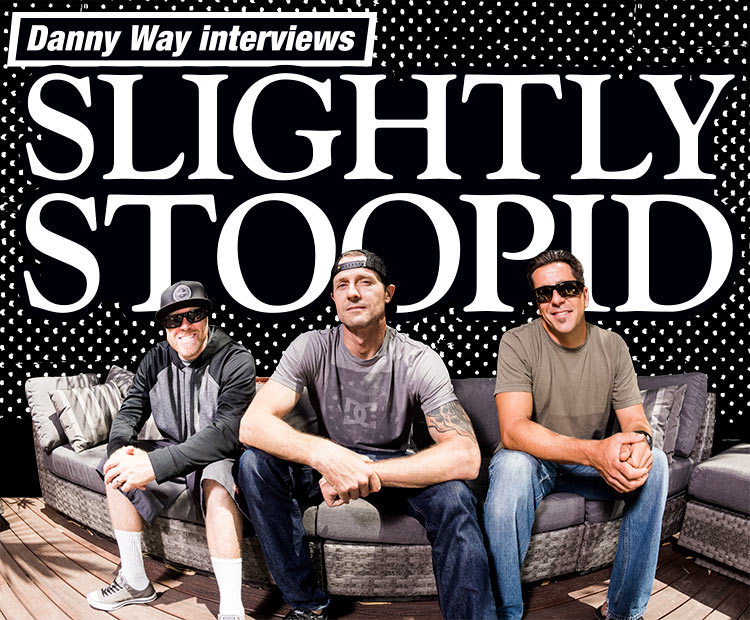
Slightly Stoopid is the most down-to-Earth group of rock stars I’ve ever met. This band has such amazing, diverse style ranging from punk, metal to reggae—they can play it all and really well. They are from my hometown of San Diego where they grew up skating, surfing and playing music. Slightly Stoopid was heavily influenced by the culture we all grew up in. –Danny Way
How long have you guys been friends?
Ryan: Oh, man, a long time now. How long has it been, Kyle?
Kyle: Fifteen years? Ryan played with the B-Side Players and we were on the road with them and that’s when we met him. It was like at least 15 years ago.
R: Yeah, it was a long time ago.
K: So we needed a drummer and he joined us. OG, our precision player in the B-Side Players, was the merch guy. So he started playing percussion for us and Ryan joined shortly after that, so we kind of have the B-Side flavor. Those guys are all about doing, like, what’s it called? Afro-Cuban and some Latin dope shit.
Nice. So how long has Slightly Stoopid been a band, then? You’ve been with them for 15 years?
R: A little less. I think it’s been about 13. I’ve known Kyle for probably about 15 years but I’ve been with the group since 2003, so about 13 years.
K: Stoopid’s been around since we were in high school in 1994. About 22 years. But Miles [Doughty] and I have known each other since we were, like, one and two, so it’s like a brotherhood. We’re just family. We’ve known each other our whole lives.
So when you guys got into playing music, what were you guys into and what was inspiring your direction?
K: We started the band and started playing guitar like Mötley Crüe, Guns N’ Roses, Metallica, all that kind of shit and that kind of got us wanting to play music. So we started playing guitar and then when we were in high school we were into Minor Threat, NOFX, Rancid, Operation Ivy and shit like that. That’s really what made us want to play and actually be in a band, were those kinds of bands.
Punk rock?
K: Yeah, and so we’d just play punk and it just kind of progressed from there.
We’ve talked about old-school skateboarding eras and the synergy between rock and skateboarding in the ‘80s and the early ‘90s. That sort of movement captivated me in terms of skateboarding and punk rock music. I know you had a little bit of that—it rubbed off on you as well.
R: All I wanted to do was just skate and blast music as loud as possible.
K: It went hand in hand, you know? Skating and thrash music, punk style music. Nowadays it’s evolved where you can mix a lot of music with surfing and skating but back in the day it really seemed like that thrash music, that kind of punk music was real appropriate for it.

Yeah that was the fuel for the skateboarding community for many years. Thrasher, for example, was kind of built on that skate/punk rock mentality or culture that was built around that. And a lot of that was spawned in Southern California or in California in general. You’re both from San Diego, like myself, and lucky to be in an area that is such a mecca for skateboarding, music and all these things.
K: Even living. It’s paradise
Absolutely. I mean, look at the weather we have.
K: I always say it’s like we live in Mexico with all of the freedom of The States, you know? Same weather. It’s beautiful. So whether you’re skating, surfing, playing music or not doing shit, we live in the best spot on Earth, I would say. We travel all around the world and there’s nowhere else that we’d rather live than here.
That’s what’s up. And I know that you guys have a pretty grassroots approach to what you do. You’ve built a lot of equity in your fan base and a lot of the people that support the Stoopid camp and organization. I know you guys have given back to a lot of different charities and you guys are pretty conscious of trying to support the giving back mentality and being proactive in that way. What’s inspiring you guys to be thinking like that? What brings that sort of consciousness to the table?
R: I mean, we’re a result of our community so if we can help give back it’s only gonna help people live a better life. We’ve been blessed to have a fortunate life and we try to do what we can to give back with whatever we’re capable of. We did some shows together a year or two ago in Hawaii to help fund some of those skateparks, you know, through your foundation which was rad and we did some autism research things here at the Belly Up in Solano Beach. We’ve done a bunch of stuff. We just did a couple things recently for Toys for Tots.
K: The list goes on. There’s so many people out there who need help and we’re lucky to do what we do. We work hard and we know we’re lucky. We’re blessed just to do what we love and to do it on another level where we help people. There’s nothing in the world more fulfilling than that. To have that opportunity is a blessing.
At one point you guys were just hanging out on the beach checking the surf. Obviously Slightly Stoopid was in the works, but it wasn’t what it is today. Prior to all the success, where was your head at? Was there an end goal or was it just something that happened organically?
R: I think everybody was pretty focused early on and hungry and determined to just get out and do it, you know? The band had always been on the road playing shows and it didn’t matter if it was for five people or 500 or 5,000. You still put that energy out and people will come eventually. The crowd will grow. And I think from the beginning it was all just about having fun and the music. Especially in the early years when we used to just set up in Kyle’s living room, like, put one microphone up and just jam, just go through different ideas and that kind of lead to, “Okay, we have these ideas. Maybe we can go record them and get in the studio.” There was always this determination of playing and staying prolific. Like, Kyle has thousands of songs to his credit, you know. He’s very prolific and there’s just that kind of hunger and determination to create. If you’re an artist or a skateboarder or a surfer or a musician or whatever, if you’re creating your art, the more you do it the better the chances are that someone’s going to appreciate it and it’s gonna start coming back to you. So I think from an early point with Slightly Stoopid it started to grow and snowball. And fortunately for us it’s really developed into a career. We all have families now and we’re able to support them and we’re able to live here.
K: Stoopid’s first gig was at our quad at lunchtime in the 12th grade. We were just stoked because we got to play music during lunchtime for all our friends. We got to drive our cars up on the campus and my friend’s, like, “What are you doing driving up?” And I’m, like, “Oh, we’re gonna deliver our equipment up to the stage in the quad.” So to us it was, like, “Wow. You can do this?” It was nice. And then when it was time for college we were just focused on getting in a van and hitting the road, just trying to make that gas money to the next gig. And sometimes you play for nobody but you still got food, something to eat and enough gas money to get to the next place and that’s all. I think everything in life takes a good amount of time to take off, you know? My friend Miguel, he was the one who produced most of our records and he produced 40 Ounces to Freedom by Sublime, their first record, and he told us when we were in high school, “It takes about five good years from the moment you start anything, especially touring or making albums, for anything to take off. Don’t expect shit. Don’t expect nothing because it ain’t gonna happen.” You kinda gotta put in some work and give it time and it’s true. It takes a good amount of time for anything you put your work into or your heart into. Don’t think about the end result. Just enjoy it, you know?
The process of getting there is what it’s about. The experiences that come with it along the way is what you’re really enjoying.
K: You’re enjoying it; you’re having a good time; you’re having fun. I mean, that’s where a lot of the good things in life come from. Sometimes when you try to do something it just doesn’t work but when you’re not trying to do shit—you’re just having a good time—that’s when the magic happens. So sometimes when you try too hard it just doesn’t happen so you just gotta let it roll out.
Yeah, I agree. You definitely have to be patient and stay the course and not be worried about the end result versus the ride. So how much has skateboarding culture played an influence in your guys music or your fan base?
R: I’d say it was pretty big. I mean, all of us skated as kids. We still skate. Kyle and I skate a good amount. We’re a little more cautious now just because we don’t want to break a wrist or anything.
K: Yeah, we like to surf but it’s, like, when you hurt yourself on a skateboard you can’t do nothing. Sometimes you get hurt out in the water, too, but you’ve got that water to rely on. But when we were kids, like, Lance Mountain and all those dudes, the Bam Bam wheels, the Independent trucks and the G&S old school peanut board, that’s kinda what got us started.
I heard G&S is making a comeback out of nowhere.
K: That was the first board that my dad got me for Christmas. I mean, when I got that thing I was just, like, “Oh my God.” It’s a game changer right there. Yeah I think it’s just kind of where we live, too, you know? It’s California.
R: That’s all I wanted to do when I was a kid: skate everyday and play music. That was a huge influence. It still is. We always have boards with us on tour. We skate around the venues, you know, because a lot of times we’re parked a mile away from where we need to be so we’ll just hop on the boards. It’s still with us. We’re just a little more cautious.
So you guys are obviously aware of Jim Phillips and Santa Cruz skateboards.
R: That was my first board, the Keith Meek Slasher. I was nine years old and I got that board. That was major. That was a Jim Phillips’ graphic. It had the guy with the dagger. He did all of the Santa Cruz stuff, didn’t he?
Yep. So Jimbo Phillips was pretty hyped to do the graphics for this project and obviously his heritage and his pops’ heritage are in the roots of me growing up in skateboarding. It was such big part of my experience as a kid, all the different companies that were relevant and the different boards that came out. I would go to the skate shop to look at the new boards that had come in—see the Slasher or the new Jeff Kendal board, new Roskop, new Jason Jessee model. Santa Cruz always had a pretty awesome collection just because of the consistency with the artwork. Jim did such a good job of creating such an iconic image for Santa Cruz through his art. I’m stoked that we were able to collaborate on this project and bring somebody like Jimbo Phillips in to work on it with us. I think it’s awesome—keeping it within the heritage of skateboarding and music and everything that we’re so lucky to be a part of.
K: Thanks for letting us be a part of it, brother. Like I say, it’s a blessing doing what you love and doing it with the people that you love and people who are your heroes.
So what’s up with the music that you guys have produced for this new project?
K: It’s little heavier. It’s a little more kind of messed up where it fits the old-school era of skating. It’s pretty much just thrash.
R: I’m really happy with it, man. It sounds awesome but it still has grit. It’s just punk and thrash.
K: The first song is like a five-minute metal intro. We kind of put it together for you because you know when you combine music with your footage and stuff? We kind of did it as like a soundtrack style.
So your inspiration was thinking about how it would pair with skate footage?
K: Well, we named it “One” For Danny, so that’s for you, brother.
That’s pretty awesome, man. I’m pretty flattered by that. I listened to the record and it’s pretty spot-on thrash punk rock and I think it represents that genre well.
K: It’s not about daisies or anything. It’s more thrash, for sure.
So how did Stoopid go from playing punk rock in the early days and now you’re one of the biggest reggae bands in the world?
R: Well, we try to mix it up, you know. We try to keep it fresh and fun. We’ll play reggae stuff but we still throw a few punk songs in, try to play some ska and stuff. We try to play what we like to listen to.
But you’ve captivated a whole genre, you know?
K: But we don’t really see it like that. We like to have fun with everything. We don’t like to do just one thing. Even the punk rock—if you just played all punk rock it would get boring, so we play everything.
Well, I’ve been to enough shows to know that you guys will throw in some pretty hardcore punk songs where you can tell some people are, like, “Whoa—I wasn’t ready for that one.”
K: We’re not trying to do just one thing ever because—
R: It’s too fun to mix it up.
K: If you eat your favorite food every day you’re gonna get sick of it. You gotta mix it up and do new things. As people, you evolve, you know. What you do and love evolves and as you get older. You want to try new things. You can’t do the same thing over and over even though you love it.
Hey, man, that’s no different than being complacent with all of the different genres in skateboarding: like, I just skate street or I just skate mini ramp or a pool or I just skate vert. You know, if you just dabble with one of those for too long it starts to get redundant and you want to experience all of it while you can. There’s a whole buffet of nice things to taste here, you know?
K: You and Ryan are like two peas in a pod. I would call both of you guys superhuman where whatever you guys set your mind to you’re good at it. Ryan, he shralps at everything: surfing, snowboarding, playing drums, he even rips the didgeridoo. I’m, like, “Damn, dude, I can’t play the didgeridoo.”
R: But it’s from that—like you said, you just want to try different things.
K: He does everything to where, it’s just like he can play Afro Cuban, like crazy ceremonial drums, jazz, tabla, he plays every instrument so it’s like a shame just to play one kind of music. Especially with the crew that we have. We have some pretty killer musicians with our crew right now.
So Slightly Stoopid is not a reggae band then?
K: We like everything.
R: I think this project will show that because it’s kind of more of a punk/thrash effort.
I think it’s an epic throwback opportunity for you guys with your heritage. I mean, the application couldn’t be better.
K: We’ve always talked about how we need to do a full punk record again like back when we were in high school. We always talked about it and then when you said you wanted to do this project that inspired us to push it through. Yeah, you made that happen. Hey, can we give Thrasher magazine a shout out? We want to shout out Thrasher magazine. Thanks for having our boy Stevie “Lefty” from OB in your interview issue. You did a nice two-page write up on him. Thanks for that. Keep up the good work. You guys are awesome.
-
4/19/2024
Skegss Interview
Australia's Skegss are the reverb drenched summer soundtrack you need. Read the exclusive Thrasher interview. -
4/19/2024
Beirut Interview
The music of Beirut has been featured in many skate vids over the years, most notably in Mark Suciu’s “Verso” masterpiece. Mark caught up with Zach Condon, the man behind the band, in this exclusive interview. -
4/19/2024
Tom DeLonge Interview
Angels & Airwaves was born out of Tom DeLonge leaving Blink-182. Here he talks about charting that band’s own path along with his thoughts on skating and UFOs. -
4/19/2024
Greta Van Fleet Interview
Using musical chemistry, the band members of Greta Van Fleet extract the essence of various classic rock anthems. They combine the parts they like and create a sound all their own. These guys truly rock and roll. -
4/19/2024
Mononeon Interview
The term "musical prodigy" doesn't quite capture the bass-playing abilities of Mononeon. It's more accurate to say he's one of the best to ever pick up the instrument. See for yourself. -
4/19/2024
Animal Collective Interview
Animal Collective blew up in the skate world when their song was used in Jake Johnson's Mind Field part—which is regarded as a masterpiece of skating/editing/music. The band's unique legacy and sound has only gotten stronger in the following years. -
4/19/2024
Thurston Moore's Interview
Thurston is a founding member of Sonic Youth and a guitar virtuoso. His various projects have created a rich musical legacy. He also has deep roots with skating and video-making. Here he describes the mutual affection between skating and his music. -
4/19/2024
Soft Kill x Welcome Skateboards
Welcome gets the singer from Soft Kill on the line to discuss music, addiction and their recent collaboration. -
4/19/2024
R.A. the Rugged Man Interview
During his 30-year career, R.A. has occupied both the spotlight and the status of an underground hip-hop legend. His song "Uncommon Valor" is regarded as a lyrcial masterpiece and he shows no signs of stopping. -
4/19/2024
Third Eye Blind Interview
After millions of album sales since the mid-90s, Third Eye Blind frontman Stephan Jenkins continues to make music without compromise or concern about radio hits and pop charts. He features Cher Strauberry in his newest video and she sat with him for an interview.
